July 18, 2025 – Invited Lecture at Goyang City Hall, Friday Dharma Q&A
Hello. Today, Sunim gave a Dharma Q&A lecture for citizens at the invitation of Goyang City Hall in the morning, and held a Friday Dharma Q&A at Jungto Social and Cultural Center in the evening.

After completing morning practice and meditation, Sunim departed from Seoul Jungto Center at 8:50 AM and headed to Goyang City.

Crossing Banpo Bridge and driving along Gangbyeon North Road, passing by Ilsan Lake Park, Sunim arrived at Goyang Aram Nuri’s Aram Theater where today’s lecture was to be held.

Goyang City organized a “Day of Communication and Empathy” event attended by over 1,000 employees from Goyang City Hall and its affiliated organizations, and requested a lecture from Venerable Pomnyun Sunim. To commemorate the third anniversary of the 8th elected administration, and to reaffirm their citizen-centered governance philosophy while fostering an organizational culture of communication and empathy, they had repeatedly requested Sunim to give this special lecture. Following welcoming remarks by Mayor Lee Dong-hwan of Goyang City, Sunim came up on stage to great applause. Before beginning the lecture, the mayor presented Sunim with a potted plant as a token of appreciation.
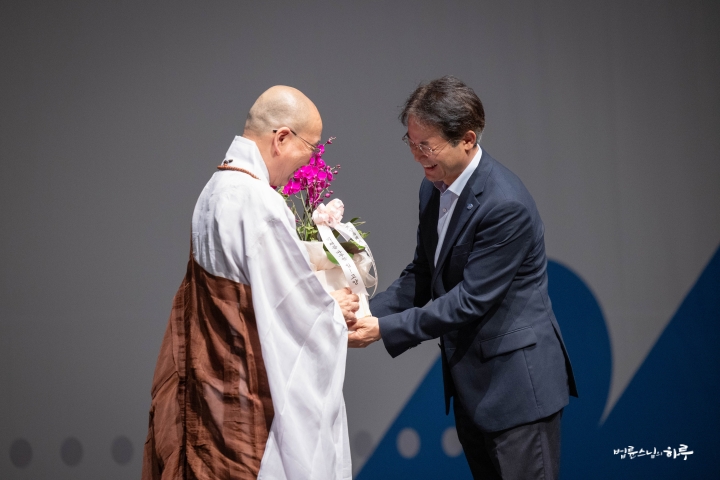
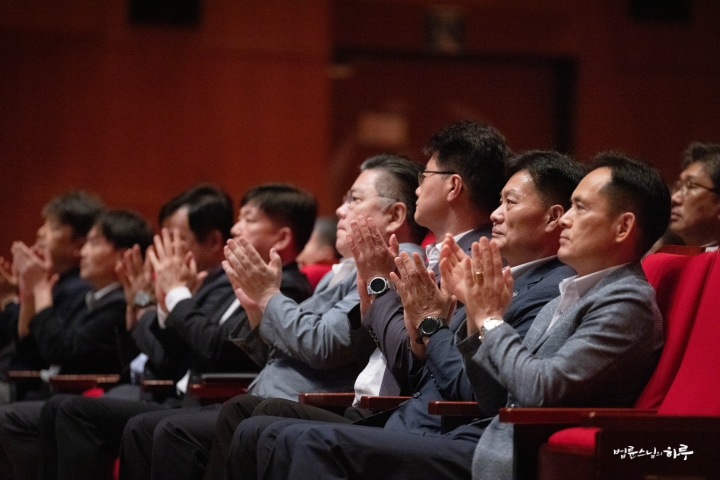
At the request of Goyang City Hall for a lecture on the theme of “Happiness and Right Thinking in Daily Life,” Sunim began by discussing what happiness truly means.
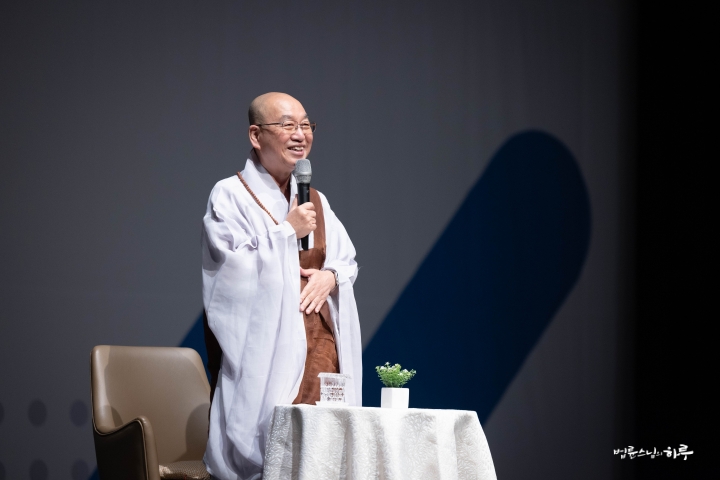
“What does it mean to be healthy? Is it healthy to run 100 meters in 12 seconds or do 100 pull-ups? Being healthy means that children are healthy as children, adults as adults, men as men, women as women, heavy people as heavy people, thin people as thin people – as long as they’re not sick, they’re healthy. Similarly, if you ask ‘What is happiness?’, happiness is not about being joyful but about not suffering. If you suffer, that’s a problem, but if you don’t suffer, there’s no problem. You can pursue joy if you want to be joyful, but if you make joy your standard of happiness, unhappiness in the form of suffering will inevitably follow. So first, you need to change your concept of happiness.
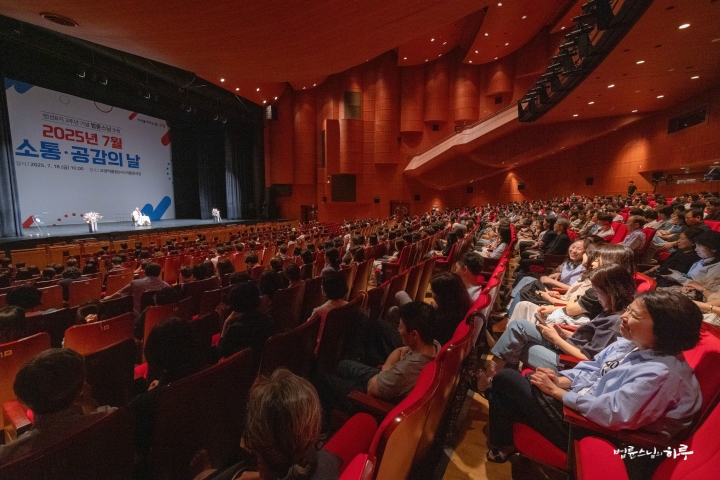
Happiness Is Not Joy but the Absence of Suffering
It’s fine to live however you want. Just don’t live in suffering. Living isn’t that difficult. Squirrels live, rabbits live – why would it be difficult for humans to live? Yet you keep saying that life is hard. Looking at our conversations, you always say ‘it’s difficult,’ and I always ask back, ‘What’s so difficult? What’s the problem?’ That’s why some people say, ‘Sunim talks like that because he hasn’t married or had children.’ However, if we look at our lives just a little bit, nothing is really a big deal.
If the mayor sitting in front were to lose the next election, it would be a big deal for him, right? But from the citizens’ perspective, it’s nothing. You think divorce is a big deal, but is it really? You originally lived alone. You held hands and lived together, then became alone again – what’s the big deal? It’s not a big deal. With just a slight change in thinking, anyone can live without suffering. But our reality is that we do suffer. So let’s examine ‘Why do we suffer?’ and ‘What is the problem?’ If you share your difficulties, let’s look together at what thoughts were mistaken or what perspectives were missed that led to suffering. So if anyone here is experiencing difficulties, please raise your hand and share.”
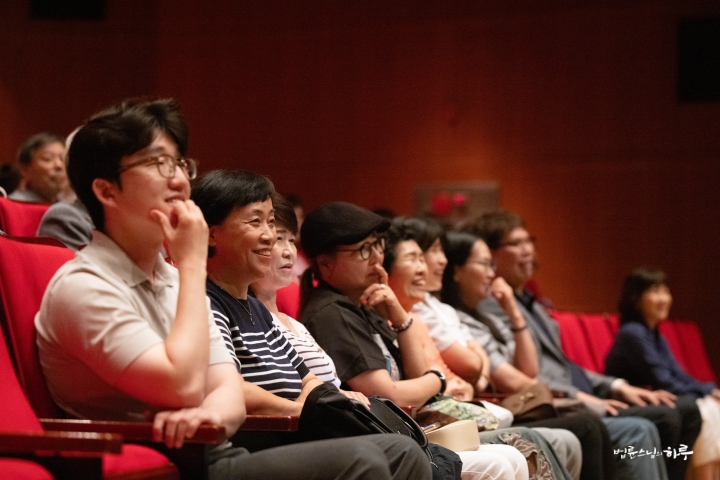
Following this, there was a time for anyone to ask questions and have conversations about difficulties they face in life.
The first person to raise their hand and ask a question was Mayor Lee Dong-hwan of Goyang City. The mayor shared that he experiences significant stress from unexpected conflicts while performing his duties as mayor, and asked Sunim for advice on how to wisely overcome conflict situations when projects are delayed due to conflicts with the city council during policy implementation.
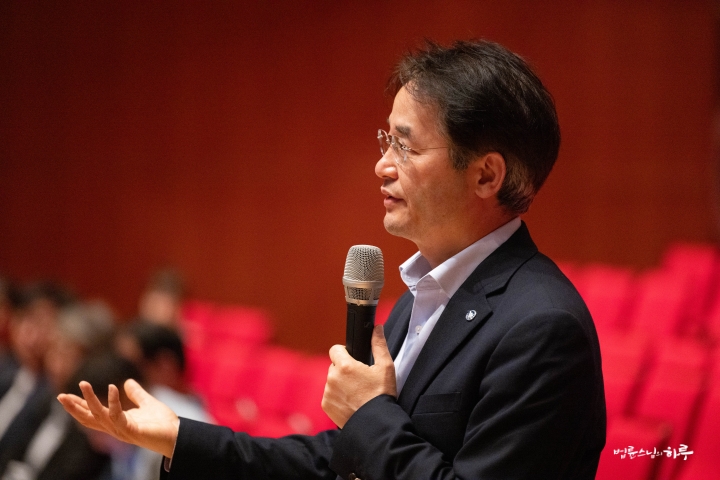
Sunim empathized with the mayor’s difficulties and spoke about the importance of democratic procedures and what healthy leadership means.
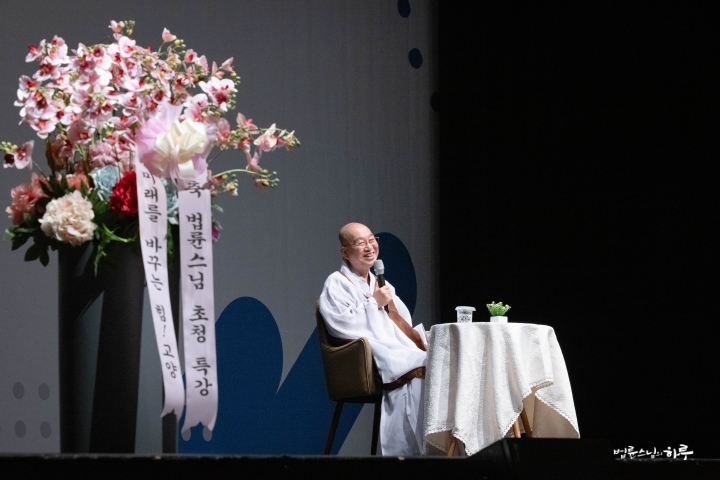
After the mayor opened up the atmosphere for dialogue, people in the audience began raising their hands and asking questions from various places. During one hour, five people spontaneously raised their hands and had conversations with Sunim. One of them shared that their second-year middle school daughter had started dating a boyfriend and was coming home late at night, which was frustrating, and asked Sunim for advice on what to do.
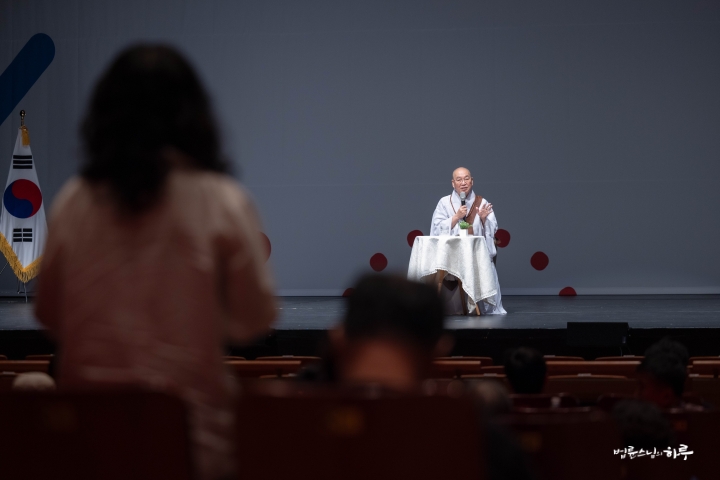
My Second-Year Middle School Daughter Is Completely into Her Boyfriend. What Should I Do as a Mother?
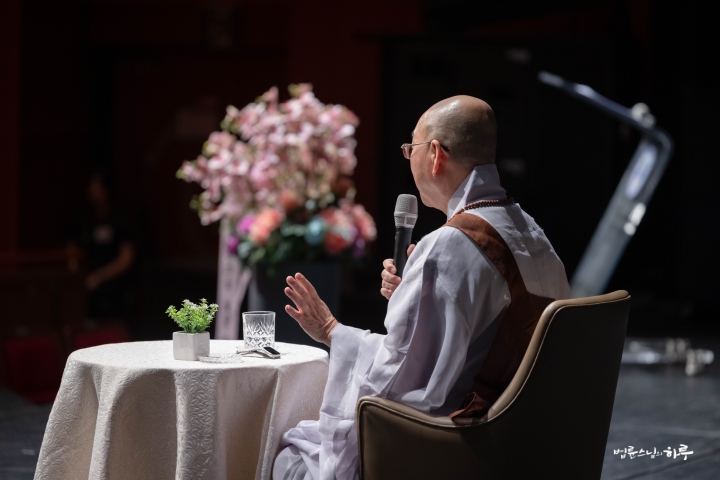
“You went to middle school too, right? When you received messages from a boyfriend back then, did it make you feel good or bad? At that age, it’s normal to feel good when you receive messages from a boyfriend. You didn’t have a boyfriend at that age, did you? It wasn’t because you were moral or a good student – you just didn’t have a boyfriend.”
“Yes, that’s right.”
“You shouldn’t view it negatively when boys and girls that age receive messages from each other. During adolescence, boys and girls need to date and exchange messages so they can get married later. If you block all of that saying they need to study at that time, they won’t know how to date people later. That’s why young people these days can’t get married. So don’t worry. Your daughter seems like she’ll be able to get married. (laughter)

If you keep viewing your child’s behavior negatively, the child will start lying to their mother. Thinking about how long you have to endure and wait doesn’t help at all. Waiting won’t solve anything. Instead of monitoring, it’s better to show interest and have conversations like friends. Try talking like this: ‘Is it fun messaging with your boyfriend? What kind of messages did you get?’ Then the child might share, saying ‘I got this kind of message.’ Even if the father scolds the child, as the mother, try to be more understanding.
Of course, if a middle school student commits crimes or has sexual relations and becomes pregnant, parents naturally need to respond. However, if you approach this problem from the beginning with the perspective of needing to control the child, you’ll end up in a situation where you have to constantly monitor them. To solve this problem wisely, you need to approach it from the perspective of ‘how to protect the child.’ For example, if a child wants to ride a swing but the mother keeps holding on because she’s afraid the child will fall, the child can’t ride the swing. You need to let them ride the swing, know there’s a risk of falling, and watch from a distance. If they really do fall, then you go and treat them or take them to the hospital. This is what it means to have a protective perspective. No matter how much you tell them not to do something, children will eventually do it. But you also can’t just abandon them saying ‘do whatever you want, whether you live or die.’ You need to set wide boundaries to keep them safe while maintaining dialogue and watching what they do.
Unless it’s a really big danger, you need to have the perspective that it’s okay. Think it’s okay as long as she goes to school. It’s okay if she comes home even if it’s late at night. It’s better than not coming home at all, isn’t it? It’s okay as long as she doesn’t have sexual relations, and even if she does, it’s okay as long as she doesn’t get pregnant. So don’t view things too narrowly – you need to look at them more broadly. If a mother doesn’t trust her child and treats them like they’re under surveillance or like a criminal, the child will feel like they’re not a trustworthy person. Then it becomes difficult for them to grow up to be someone who is trusted in society later.
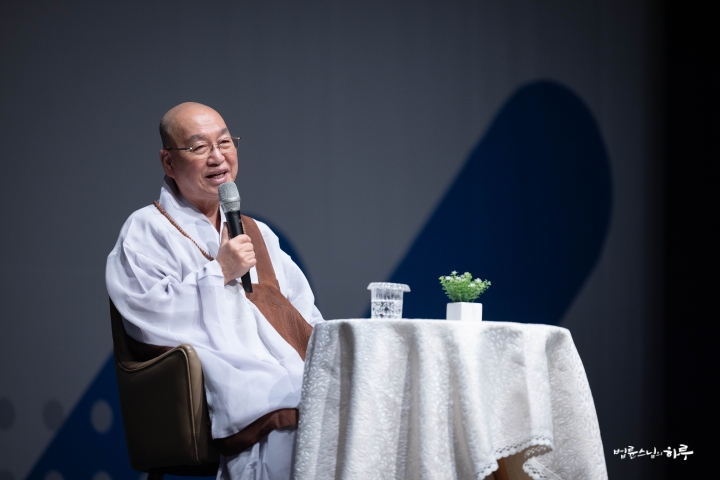
A mother should view her child with the perspective of ‘I’m okay as long as you’re healthy,’ ‘It’s fine if you just go to school,’ and ‘I love you,’ always watching over them with concern rather than interference. You need to give your child the belief that no matter what happens, their mother will support and care for them. When a mother views her child from this broader perspective, the child will also learn to exercise self-control. This doesn’t mean cutting off the relationship immediately. It means having just enough perspective to prevent danger. You asked how long you should wait for your child to stop, but the child won’t stop. Life continues this way – they’ll date, get married, have children, and live their lives.
If humans grew up in a natural state rather than in an artificial society, they would naturally start dating and having children around the age of a high school freshman. Marriage systems used to work this way in the past. But now, because human society artificially prevents this, we have youth problems. During the Joseon Dynasty, people got married at fifteen. That’s why the teenage sexuality issues that are problematic in today’s society couldn’t exist back then. Youth problems arise because of social systems that go against nature. Your daughter’s feelings and interest in the opposite sex are natural.
However, if she’s too absorbed in social media, it would be good to quietly take her to a hospital for psychological counseling. This is because when someone is psychologically anxious, they can’t stay still and try to stabilize their psychology through behaviors like constantly checking social media or their boyfriend’s messages. Your daughter’s behavior might be a sign of psychological anxiety, so it would be good to quietly take her to the hospital for other check-ups while also getting a psychological evaluation. You should approach this from a perspective of caring and nurturing, not monitoring, controlling, or restricting. If your child isn’t studying, won’t come out of their room, and isn’t eating well, there might be a mental health issue. In such cases, instead of scolding or nagging, you should check your child’s condition and think about how to treat and support them. As a parent, you need to approach this with this perspective. Only then will this issue not become a major concern.”
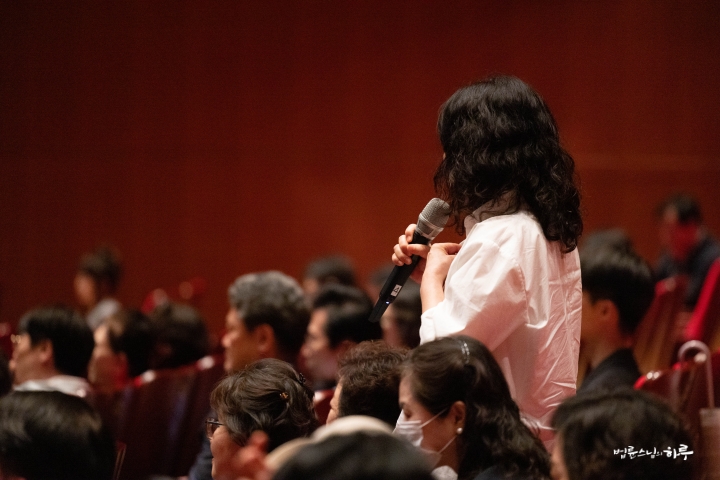
“I even took him to a psychiatrist. But my child refuses to take the medication.”
“What did the doctor say?”
“The doctor suggested we try some medication since my child isn’t sleeping well.”
“The first characteristic when mental health issues arise is difficulty sleeping. When someone is psychologically anxious, they cannot sleep deeply. The second characteristic is becoming obsessed with things like SNS or TV, or developing a tendency to excessively depend on certain people. Perhaps your child doesn’t want to take the psychiatric medication because it makes them feel drowsy and foggy. In such cases, don’t call it psychiatric medication. Instead, consult well with the doctor and try to gently persuade your child. You can also help your child’s treatment through food. For example, there are foods that help with psychological stability and sleep. Getting such ingredients and helping your child become psychologically stable through food is another method.
From what you’re telling me, your daughter liking her boyfriend isn’t the big problem right now. In my view, your daughter’s psychological anxiety seems to be the bigger issue. Parents need to work with the doctor through consultation to help more deeply with that aspect.”
“Thank you. I understand well.”
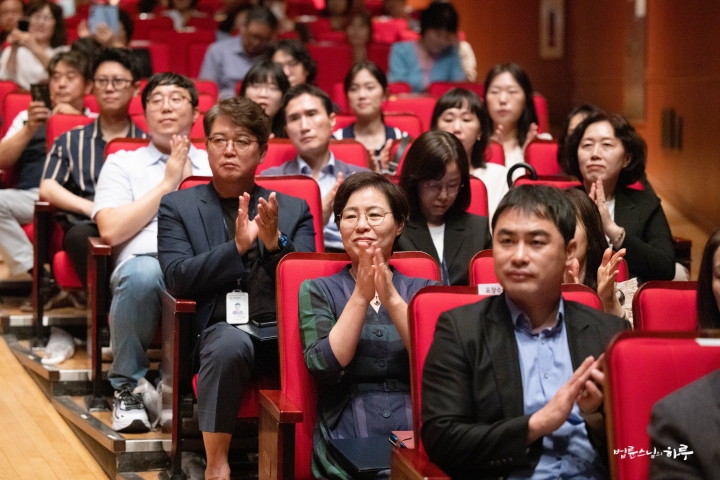
Questions continued one after another.
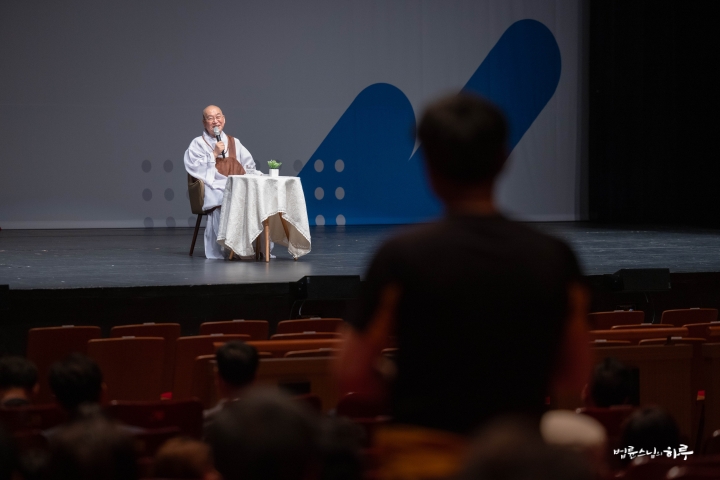
A landowner in our neighborhood is blocking the road. The residents are telling him not to block it, but the landowner insists he hasn’t received compensation. As the neighborhood representative, how should I resolve this conflict?
My voice is too loud and my opinions are too strong, so when I talk with customers, they often ask why I keep getting angry. How can I overcome this feeling of being intimidated?
My son’s girlfriend had breast cancer surgery and received chemotherapy, but there’s still a risk of recurrence. My husband opposes their marriage. What should I do as a mother?
I’m raising two granddaughters who fight a lot. As their grandmother, what should I do between them?
Many more people wanted to ask questions, but it was time to finish. After ending the lecture at 12 o’clock, Sunim moved to the reception room with Mayor Lee Dong-hwan for tea and conversation.
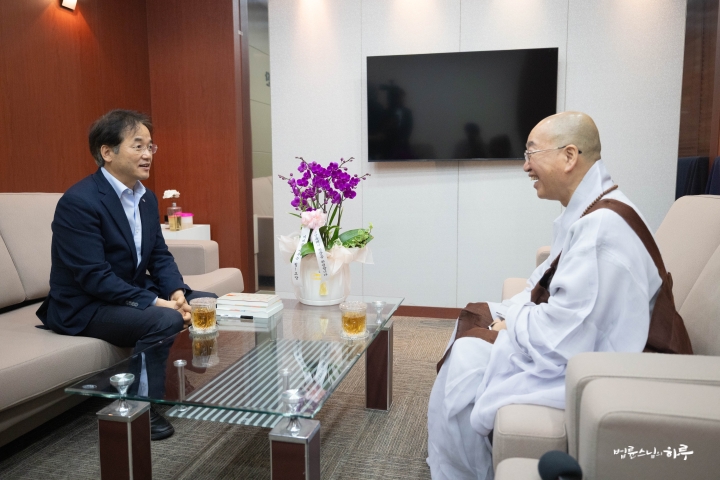
“I hear civil servants have a hard time handling complaints. How many complaints does Goyang City receive?”
“We receive 700,000 complaints annually. We’re handling an average of 60,000 complaints per month. We have 50 staff members working just in the complaints department. Since our population exceeded 1 million and we became Goyang Special City, we receive as many complaints as we have residents.”
“That’s a lot of hard work.”
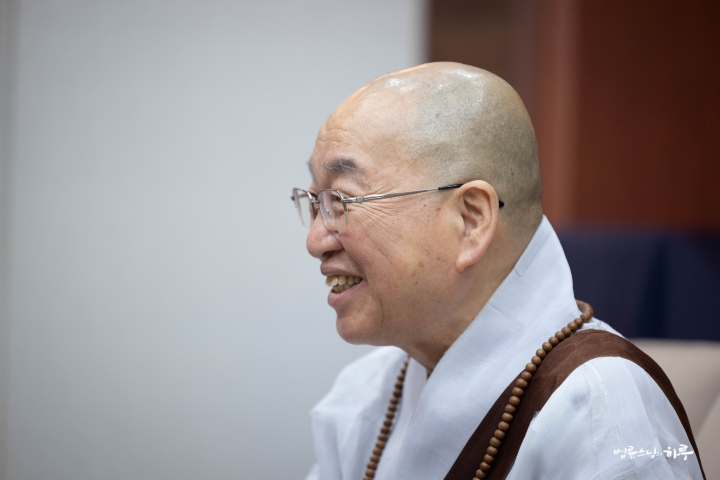
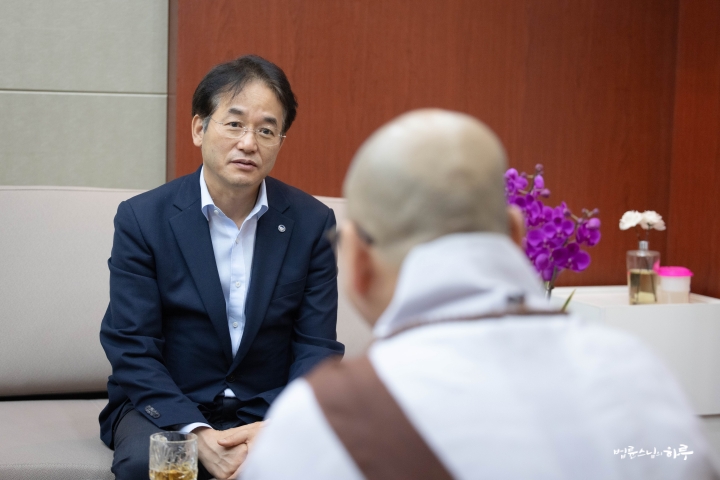
Sunim and the mayor had extensive conversations about how democracy should be implemented in citizens’ daily lives. After finishing their tea, the mayor showed books by Sunim that he had personally purchased and asked for autographs.
“I’ve watched many of Sunim’s Dharma Q&A YouTube videos, and I wanted to read your books, so I bought them myself.”
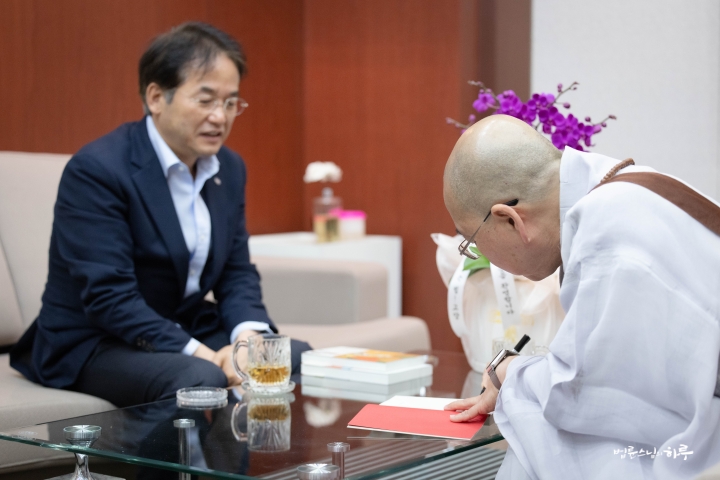
After taking a commemorative photo together, they left the Goyang Aram Nuri Aram Theater.
“Sunim, thank you for making time despite your busy schedule.”
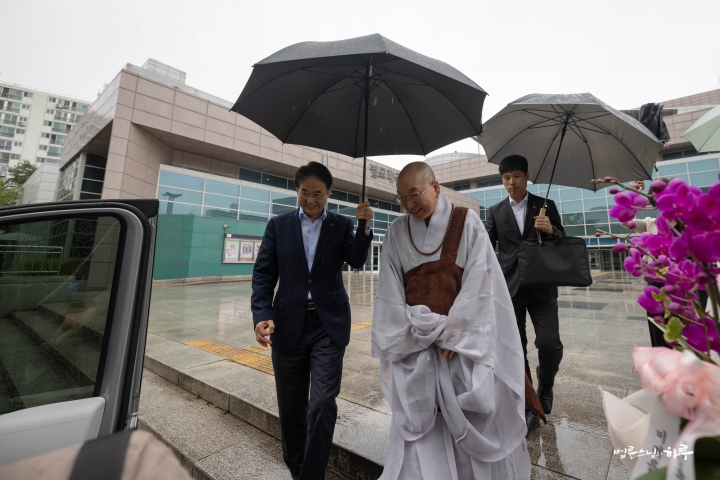
After exchanging greetings, they departed from Goyang City and headed back to the Jungto Social and Cultural Center.

Amid a light drizzle, they arrived at the Jungto Social and Cultural Center at 1 PM. In the afternoon, various social figures visited The Peace Foundation to meet with Sunim.
At 2 PM, former Democratic Party member Park Yong-jin visited Sunim for tea and conversation. He sought advice on the direction Korean society should take and discussed various topics before leaving.
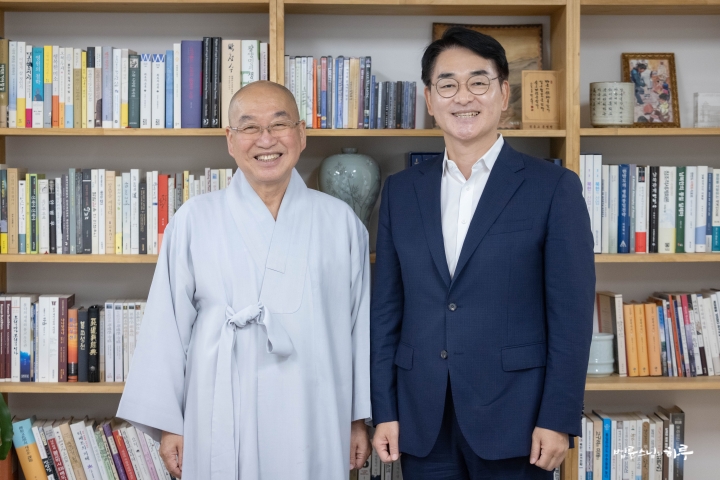
At 4 PM, Director Jang Won of the Rural Utopia Research Institute, who is recreating and publishing Sasanggye magazine, visited Sunim for a meeting. Director Jang, participating as editor of the comprehensive cultural magazine ‘Sasanggye’ revived after 55 years, explained that he is creating a specialized magazine about new civilization and asked for Sunim’s interest and support.
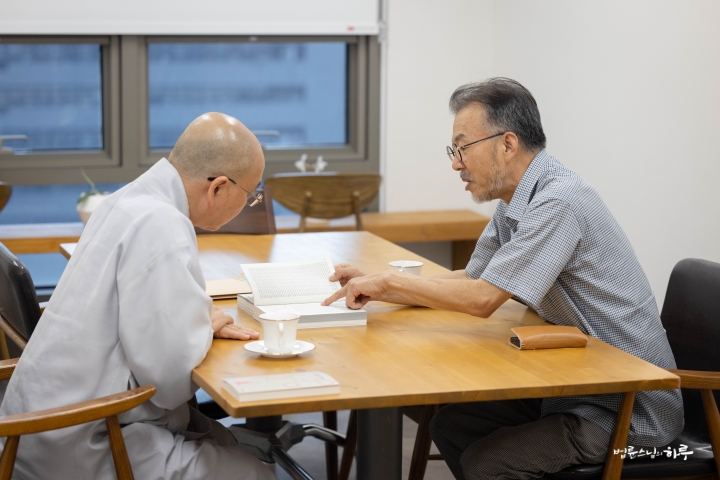
The Sasanggye magazine will function as a public interest magazine like in the days of the late Jang Jun-ha, and to remain free from capital pressure, they decided not to accept advertisements. Sunim promised to show interest and support, and the meeting concluded.

As the sun set, at 7:30 PM, the Friday Dharma Q&A began at the Jungto Social and Cultural Center. Many citizens visited the center after work to attend the Dharma Q&A. About 4,500 people connected via YouTube, and 250 people were present on-site.
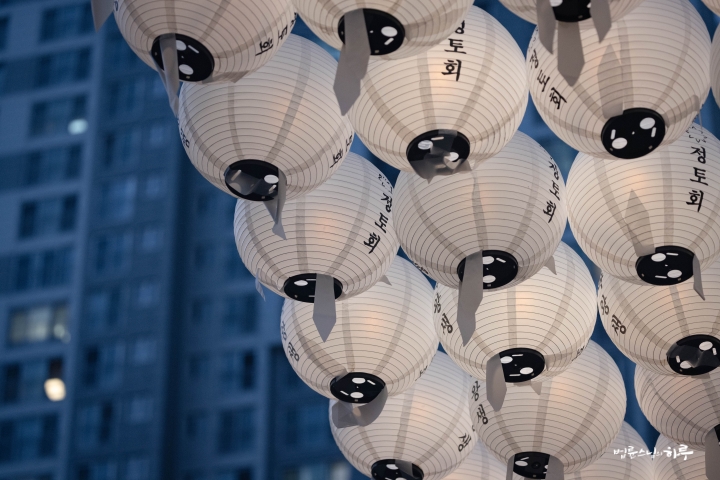
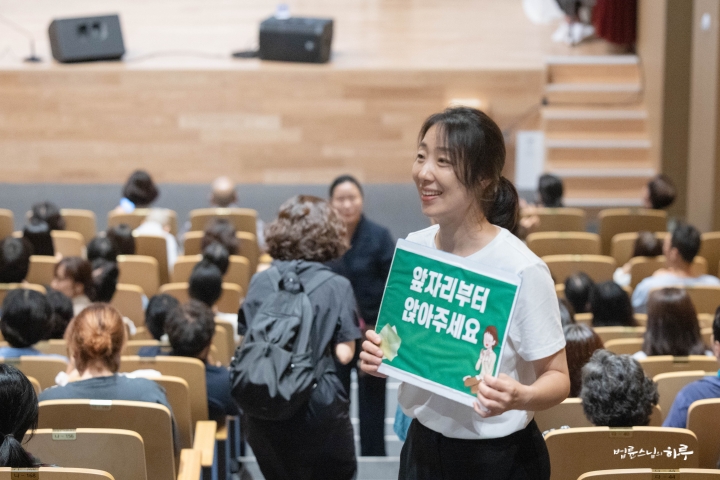
Before the lecture, Kim Dong-ha, a young Jungto Society volunteer, sang two songs, “To a Lady” and “Happy Together,” with a warm voice, receiving great applause from the audience.
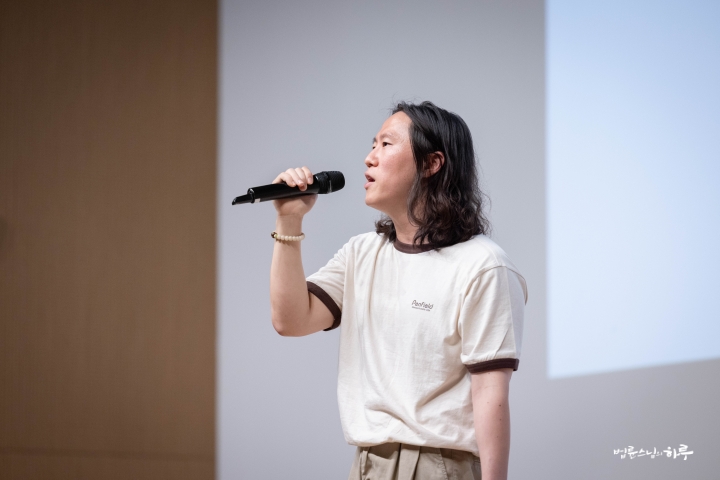
After reciting the Three Refuges and Words for Practice, Sunim took the stage and gave opening remarks.
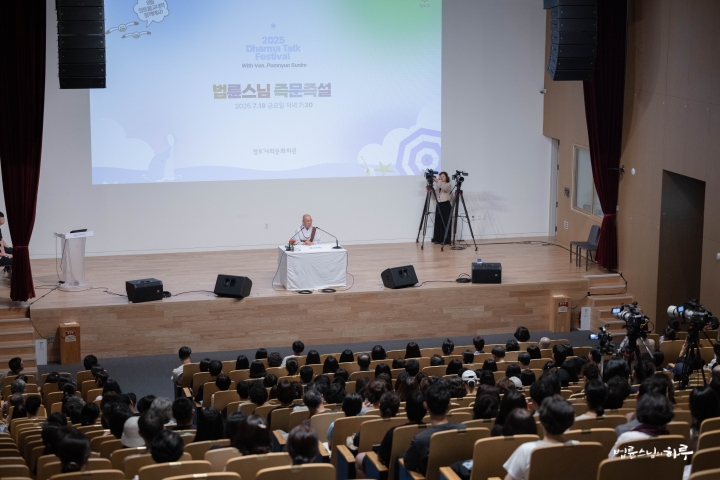
“Heavy rain has been pouring across our country for several days. We’re hearing news that many people in the Chungcheong region are experiencing difficulties due to flood damage. On the other hand, the hot weather that continued all last week has cooled down due to the continuous rain. It must have been inconvenient coming here on a rainy day, so I’d like to thank so many of you for attending.”
For an hour and a half, seven people raised their hands and had conversations with Sunim. One of them was worried about her relationship with her sensitive and immature high school sophomore son and asked Sunim for advice on whether it was right to treat him as an adult and cut off support.
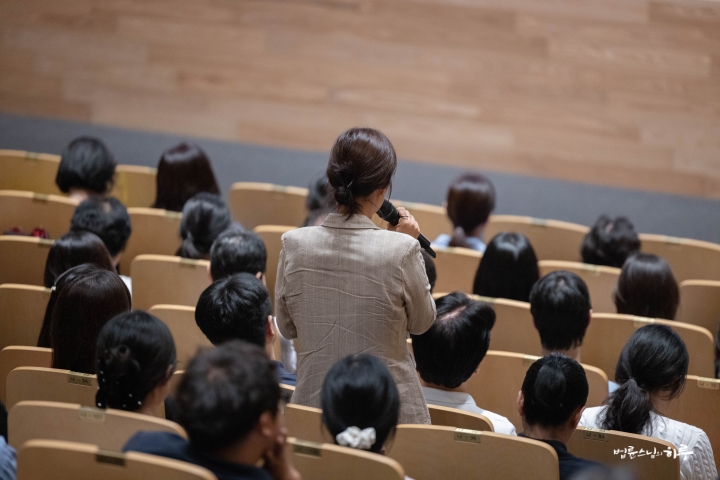
My Son Is Addicted to Gaming with His Days and Nights Reversed. How Can I Help?
It’s very difficult to wake him up in the morning. When he wakes up, he says it’s ‘like hell.’ Now he says he wants to become a professional gamer and is living alone. When we occasionally talk on the phone or when he’s home on weekends, I see he sleeps all day and stays up all night gaming repeatedly. He doesn’t eat properly and doesn’t sleep at night, which is frustrating as a parent. I’m also afraid about whether he can endure military service in such a state – unable to wake up, not eating, and severely underweight. I feel helpless and frustrated about what to do.”
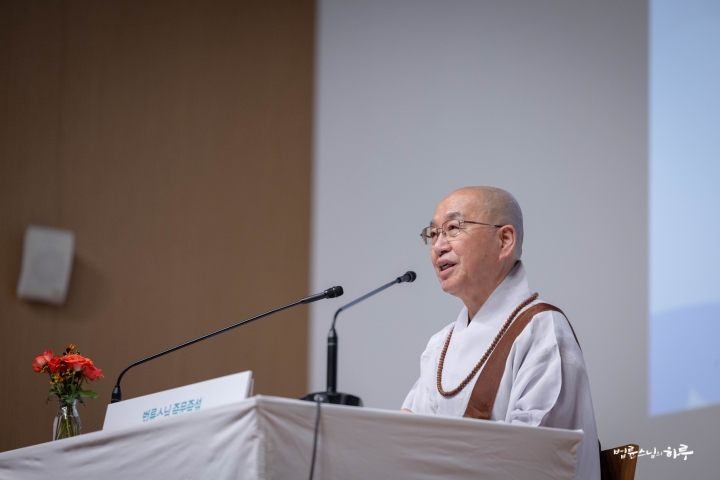
“Yes, I heard you well. First, it’s difficult to accurately assess your child’s condition based solely on what you’ve said. However, based on what you’ve shared, I think your child may be experiencing mental or physical difficulties. When he can’t wake up in the morning, from a mother’s perspective, you might wonder why he can’t wake up when he seems fine, but from the child’s perspective, he might be in a state where he wants to wake up but cannot.
If your child shows differences from peers in speech, behavior, or cognitive aspects while growing up, you should consult with a doctor specializing in child psychology. You need to examine the child’s physical and mental developmental state and first check whether there’s a congenital disability or not. If diagnosed as a condition, then treatment can begin. Of course, even with treatment, there are limitations. You must acknowledge that some disabilities cannot be completely recovered even with treatment. In such cases, education appropriate to the child’s situation is necessary.
If a child’s ability to recognize or remember things is at 80, then learning guidance should match that 80 level. Pushing a child at 80 to work harder doesn’t make them 100. When teaching a child at 100 once, a child at 80 should be taught twice as the goal, and the child should be trained accordingly. If your child is diagnosed with an illness, you should ensure he receive treatment. If diagnosed not as an illness but with a slight disability, education should match that disability level. When a child has reduced cognitive ability, they cannot accomplish everything parents expect. When they cannot handle tasks, the child experiences psychological pressure and eventually thinks of themselves as inadequate. Eventually, they avoid and give up on tasks. When this happens, educational effects no longer appear. First, you need to check your child’s condition. Caring for your child according to that diagnosis is what’s needed as a parent.”
“From what I see, his cognitive ability doesn’t seem impaired. When he talks back, he speaks quite cleverly.”
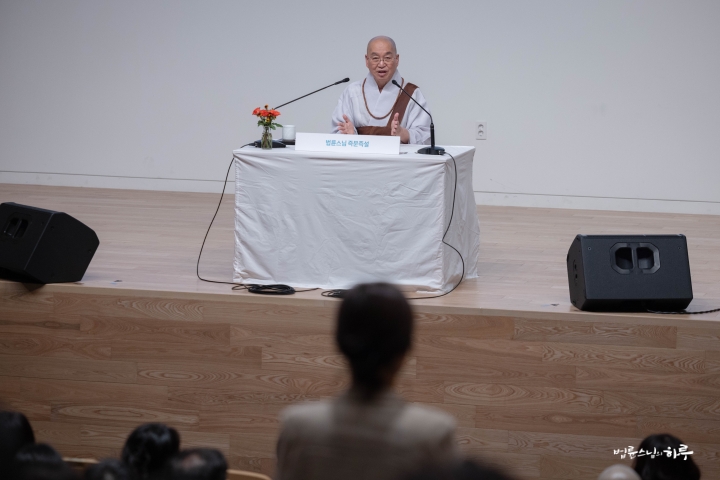
“Talking based only on your own judgment without a doctor’s examination doesn’t help improve this situation at all. You must leave judgment to professionals. Accurate diagnosis comes through examination by professionals. Treatment and education matching the diagnosis must follow. A mother gives birth to and raises her child, but cannot accurately know the child’s psychology or cognitive ability. Thinking there’s no problem just because he talks back well is too careless an attitude.
Everyone has things they’re good at and things they’re not. However, parents tend to think their child is good at everything after seeing a few things done well, or bad at everything after seeing a few things done poorly. Actually, when you look at things individually, there are things done well and things done poorly. If you don’t know this and generalize based on partial observation, you won’t understand your child like you do now. Someone who looks foolish might have exceptional areas, and someone who looks intelligent might actually behave foolishly.
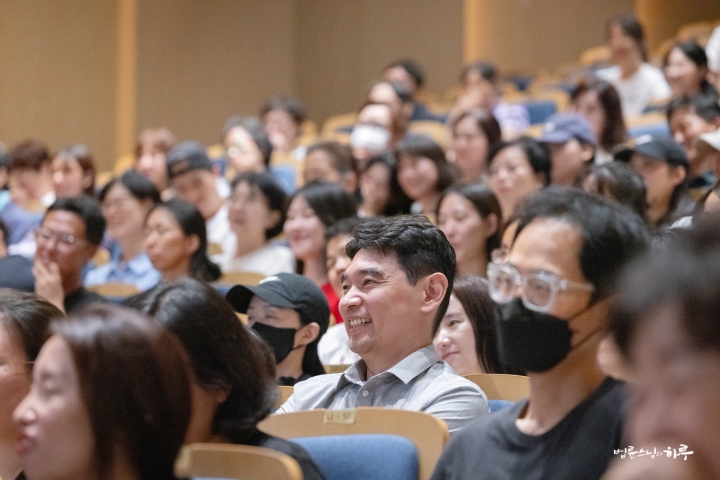
Everyone has different biological rhythms. Some people are alert in the morning and sleepy in the evening, while others are drowsy throughout the morning but become wide awake in the evening. Even among those living together in the Jungto Society lay Sangha, some people doze off during morning practice every day but become bright-eyed in the evening. The opposite is also true. Among drivers, some can drive late into the night without any problem, while others can’t drive at night due to drowsiness and can only drive in the early morning. So everyone should live according to their own condition.
Without an accurate diagnosis like yours, if you try to understand your child only by your own standards, you may not know your child at all, even though you gave birth to them and live in the same house. Instead of pretending to know, you should first get an accurate diagnosis from a professional. You need to accept the results, and if it’s an illness, you should work on improvement through medication or counseling. Also, if it’s a behavior that has become habitual over a long period, it will take a lot of time to change. You need to be patient and make consistent efforts for change.
Since you took time off work and raised your child with great care until they were three years old, you have high expectations for your child. When your child doesn’t meet those expectations, you end up nagging them repeatedly. This repetition may have led to the current problems.
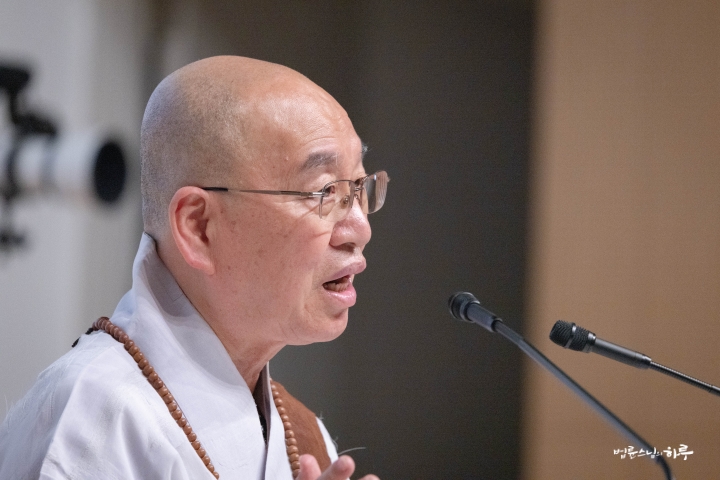
Parents’ excessive expectations can turn their children into people with many problems. Parents should always observe their children as they are and work together to find ways for improvement. Rather than concluding that there is a problem, they should seek an accurate diagnosis and receive treatment.
Fathers who drink and beat their children are often mentally ill. In fact, they are living more painfully than ordinary people. Who could feel at ease while beating their own child? They are patients who cannot control themselves. In the past, people didn’t know they were ill, so they just lived that way. While young children suffer great trauma, the parents who beat them can also be said to have mental illness. Therefore, you should first check the child’s condition and take care of them accordingly. If you keep imposing your expectations, you will continue to bring unhappiness upon yourself.”
“Yes. Thank you. As a parent, I thought I knew everything about my child, but I’ve realized that I wasn’t being objective in some areas. Thank you for your sharp correction.”
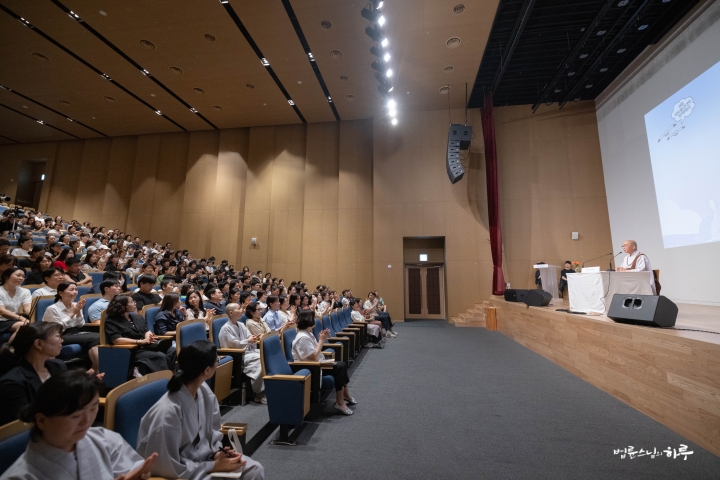
“There’s a saying that the most frightening thing in this world is certainty. While being full of conviction seems to have its good aspects, it is precisely the cause of all conflicts. This is because we mistakenly believe that what we know is everything. The important teachings of religion are peace and love, but why does religion, far from bringing peace, always bring conflict, and far from love, bring hatred? The foundation of religion is faith, but when faith deepens, it becomes certainty. When the thought that ‘I am right’ becomes strong, conflict and hatred arise.
None of us can know everything, and what I know cannot all be correct. While ‘certainty’ is a driving force, it is also the cause of all suffering and conflict. Similarly, the confident thought that ‘I know everything about my child because I raised them’ can make the child sick. That’s why parents should always observe their children carefully. Situations always change. What was true until yesterday may be different today. While it’s true that because something happened yesterday, there’s a high probability it will happen today, nothing is absolute. If you have the perspective of observing day by day based on changing reality when looking at others or yourself, your life can become a bit more free.”
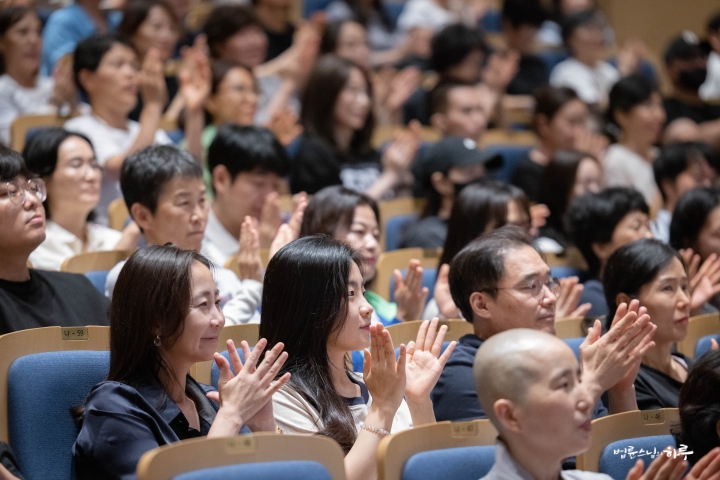
Questions continued to come in.
I grew up in an unfortunate family environment, exposed to my father’s violence from a young age. Perhaps because of this, I want to be flexible in relationships, but I keep running away. What should I do?
During my childhood, I lived in fear that my dad might kill my mom, and my mom abused me. I feel skeptical about humanity. How can I escape from this suffering?
I thought we had consensual sex, but the other person reported me to the police. I’m worried about whether my criminal record will limit my employment opportunities and whether this will happen again if I meet someone else.
My father has suffered from bipolar disorder for a long time and is now bedridden due to chronic illness. His mind is clear, and he says he wants to stop eating and end his life. What should I do?
Korean society is an unfair society where opportunities are not given equally to everyone. I’m curious about what you think about this.
I’ve seen the arrogance within my heart. I don’t openly disrespect others, but I feel like the arrogance deep in my heart will be conveyed to others. How should I act to let go of this arrogance?
By the time the conversation ended, it was 9 PM. Sunim concluded the lecture with the Four Great Vows, promising to meet again at the same time next week.

Tomorrow morning, Sunim will meet with a social figure visiting The Peace Foundation to discuss South Korea’s diplomatic and security issues. At lunch, he will have a meal and tea conversation with Venerable Dongmyeong, a senior member of the Jogye Order Council. In the afternoon, he will attend the 5th Seowon Practitioner Ordination Ceremony of Jungto Society and give a Dharma talk.





